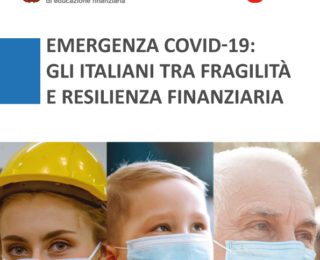As a result of the Coronavirus-related health emergency, Italian households reporting that they are struggling to make ends meet have increased by 12 percentage points (58 percent overall). This means that approx. Six out of 10 households believe they are in greater distress as a result of the COVID-19 emergency. In addition, 3 in 10 households would find it difficult to raise 2,000 euros within a month to deal with an unexpected expense, such as car repair, an unexpected purchase of an appliance, a medical expense or similar emergencies.
These are some of the main findings from the survey “
COVID-19 emergency: Italians between fragility and financial resilience.
“, commissioned by the
Committee for the planning and coordination of financial education activities (Edufin Committee)
to the market research and analysis company Doxa.
The survey also showed that having high financial knowledge helps one to be financially less fragile, that is, able to cope better with difficulties. In fact, 27.7 percent of those who feel they have a high level of basic financial knowledge would easily make ends meet despite the current crisis, compared with 12 percent of those who feel they lack adequate knowledge.
The data show that financial fragility existed even before the crisis: more than one-third of households (36.6 percent) would not have had the resources to cope with the lack of income for a period longer than two months.
The survey was conducted between May 27 and June 10 among a representative sample of 5 thousand households through the administration of an online questionnaire. Aim of the study: to measure knowledge, behaviors, financial attitudes of Italians even in the wake of the COVID-19 emergency.
The segments of the population who say they are having a hard time making ends meet as a result of the COVID-19 emergency are mainly those residing in southern Italy or the islands (65 percent), women (61 percent) and those with a low level of education (65 percent).
Finally, the survey confirms the low financial literacy of Italians: less than one-third of respondents (29 percent) know the basic concepts of finance, such as simple interest rate, compound interest rate, risk-return relationship.
“We conducted this survey to explore the impacts of the COVID-19 emergency on the financial condition of Italians, making this wealth of data and information available to policymakers and citizens. The survey – explains Annamaria Lusardi, Edufin Committee Director– demonstrates the Close correlation between financial literacy and coping in times of crisis and hardship: those who have more knowledge of basic financial concepts can cope better with a large and sudden shock, such as that due to a pandemic, cope better with situations of economic stress, and are ultimately more resilient. Therefore, it is necessary to strengthen and systematize initiatives aimed at increasing the financial knowledge of Italians. Lusardi adds, “The Committee has taken this path by developing a program to implement the national financial education strategy and by launching, through its portal quellocheconta.gov.it and Financial Education Month, extensive awareness and information campaigns on personal finance issues. It is important for all institutions and stakeholders to team up and collaborate to make citizens more informed and aware.”


